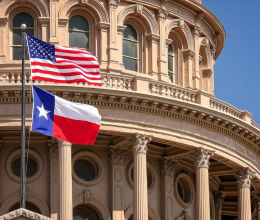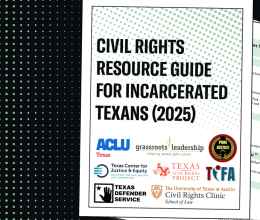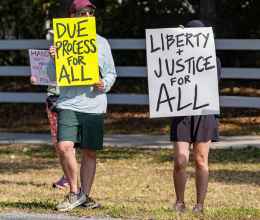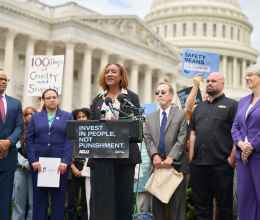
A Win for Texas: Proposed Limits on Investment by Judges in For-Profit Prisons
Matt Simpson
Policy Strategist
On Tuesday, the Senate Jurisprudence Committee will hear HB 62, a bill filed by Representative Ryan Guillen that proposes to limit investments by judges in private prison companies. The bill would prevent conflicts of interest similar to the dramatic incident in Pennsylvania in which a judge was found guilty for routing defendants through his court and into facilities in which he held a financial interest.
Clearly, Rep. Guillen wants to prevent judges from being unduly influenced by their investment in a private prison. The bill will also demand greater accountability and transparency among private prisons in general.
But this is just one small step toward what should be much larger scale reforms. Rep Guillen is familiar with the host of issues surrounding private prisons: He represents a district in South Texas that includes the privately-run, federal immigration detention facility Willacy Detention Center, located in Raymondville, TX.
Those issues include the following:
First, private prisons do not have the same obligations under the state’s Public Information Act as other state-run entities. Texas should clarify in law that private prisons (and really any entity that contracts with the state) have the same obligations to provide public access to records related to the expenditure of state money. Presently, private prisons can avoid full transparency.
Second, the process by which a private company is brought into a community should involve greater public input. The local community should have a say when a private prison comes to town—or when a company takes over a publicly run facility. Too often, decisions to privatize jails and prisons are made quickly and without public input. Requiring a public hearing is one way to fix this. In 2009, the ACLU of Texas and other advocacy organizations suggested as much in HB 3903; unfortunately, that bill didn’t pass, and the proposal has not progressed since.
Finally, HB 62 almost implicitly begs the question: Who else is receiving money from private prisons? HB 3903 (from 2009) and many other proposals have encouraged the state legislature to limit investments in and direct income from private prisons by and to individuals with potential conflicts of interest, e.g., county officials, sheriffs, and other community leaders, as well as policymakers who could similarly benefit from the privatization of prisons or jails.
Rep. Guillen has taken the lead, pushing this issue to the forefront in the Texas legislature. But we should view this bill as the first step—not the final reform—toward improving transparency and accountability for privately run prisons.
Related Issues
Related content


ACLU of Texas Responds to State Officials’ Attacks on Nonprofits
November 19, 2025
Why Police Traffic Stops Are Dangerous and Ineffective
October 30, 2025
Advocating for Your Rights Behind Bars: How to Use Our Civil Rights...
August 15, 2025
Texas’ Money Bail System Is Unfair and Ineffective
July 18, 2025
What Is Due Process?
May 28, 2025
ACLU of Texas, Civil Rights Groups Send Letter to Texas Lawmakers...
May 23, 2025
ACLU of Texas Comments on Passage of S.B. 9 — Bail Bill That...
May 19, 2025